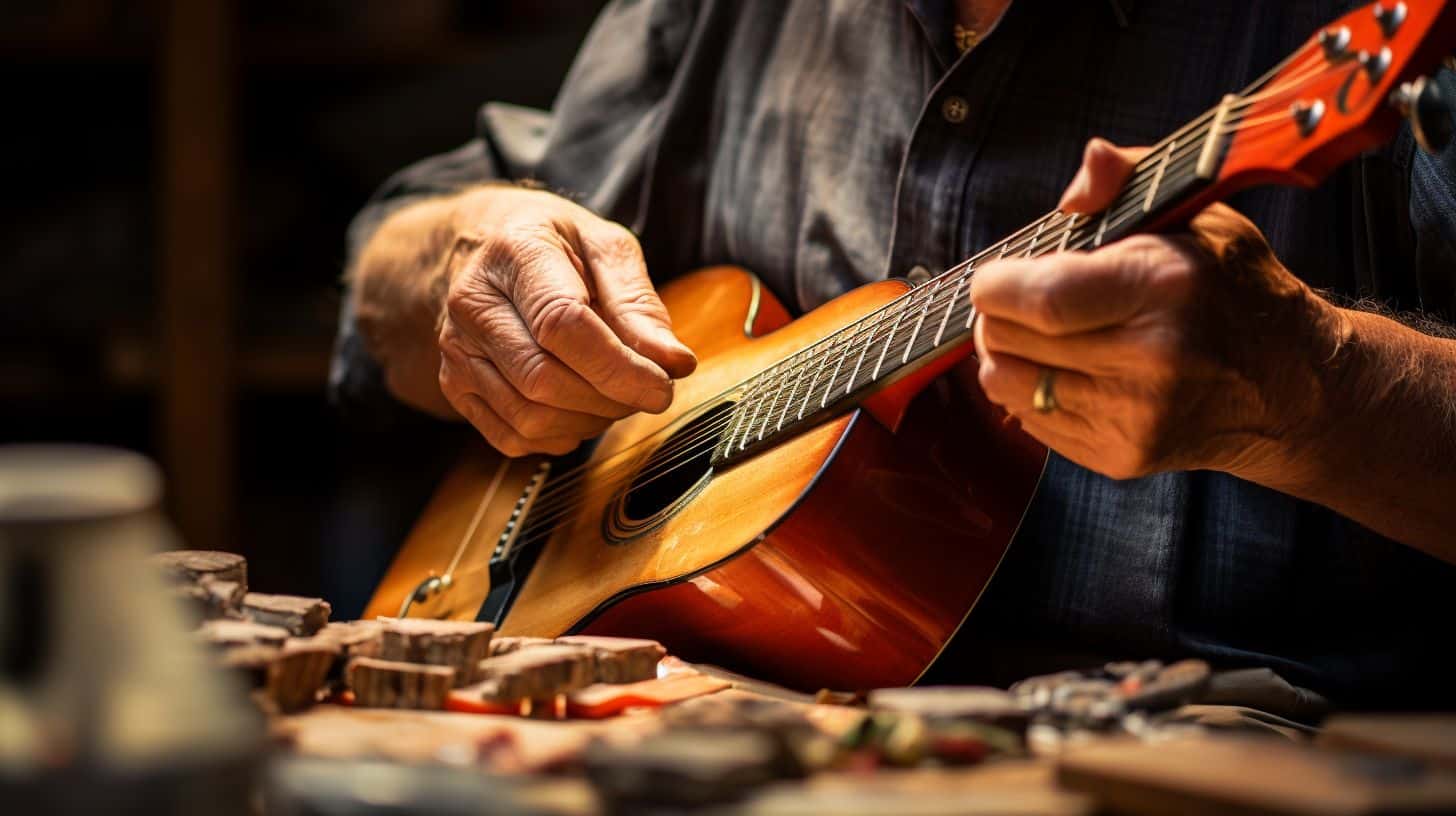A Guide To Playing Ukulele And Maintaining Your Nails
Are you a ukulele enthusiast with long nails struggling to produce the perfect chords? The fact is, playing ukulele with lengthened fingernails can be both an advantage and a challenge.
This blog post will serve as your guide, exploring the impact of nail length on playing and offering tips for maintaining your natural or acrylic nails while strumming those strings.
Let’s dive in and unlock the secrets to mastering ukulele playability, even with lengthy nails!
Key Takeaways
- Long nails can affect your ukulele playing, allowing for louder sounds but making holding notes tricky.
- Both natural and acrylic nails enhance musical tones. However, they need careful management to prevent damage.
- Nail length should depend on personal choice and style of play. Usually, short ones are preferred on the fretting hand, while longer ones work best with strumming.
- Natural nails need strengthening foods like Omega 3 and biotin. For acrylics, regular salon visits and clear varnish help upkeep.
- Alternatives to using your fingers include picks or thumbs, which may introduce variety into sound production.
Can You Play Ukulele With Long Nails?

Playing the ukulele with long nails indeed poses a set of unique challenges, whether you have natural or acrylic ones. Differences in nail length can affect your instrument’s sound and impact your overall playing technique.
However, through careful maintenance and adopting certain strategies, it’s entirely possible to strum those strings despite having long nails.
Natural Nails Considerations
Playing the ukulele with long natural nails can produce a louder, more articulate sound. This transformation happens due to the hardness of your nails, which gives you more control over the strings and enhances attack.
Moreover, long nails allow for accurate plucking when playing fingerpicking style. However, on the flip side, holding notes or chords accurately becomes challenging if your fretting hand has lengthy nails.
Therefore, maintaining optimal nail length strikes a balance between comfortable playability and sound quality. Also, regular care is necessary to prevent breaking these longer nails as they are prone to damage during vigorous strumming sessions.
Proper nutrition intake, including omega-3 fatty acids and biotin, aids in strengthening your natural fingernails, making them durable for ukulele playing.
Implications of Acrylic/Fake Nails
Acrylic or fake nails can significantly influence the sound produced while strumming a ukulele. They often create a louder, brighter, and more articulate tone than natural nails. Acquiring such a distinct sound motivates some musicians to opt for acrylic nails or even take regular trips to nail salons for high-quality artificial counterparts.
However, playing notes and chords accurately may become challenging with long acrylic nails on the fretting hand. The unnatural thickness of these nails may cause off sounds by muting strings unintentionally or making it hard to grip the ukulele neck properly, thereby affecting the overall performance quality negatively.
In worse scenarios, they could damage your ukulele’s fretboard over time if not adequately managed. That’s why professional musicians usually maintain shorter lengths on their fretting hand compared to the strumming one.
The Effect of Nail Length on Playing Ukulele

Long nails can drastically influence your ukulele playing experience, particularly affecting the fretting and strumming hands differently. They may enhance or hinder your ability to produce clear sound depending on their maintenance and how you adapt your technique.
Let’s delve into these nuances to better understand the impact of nail length on ukulele play.
Impact on the Fretting Hand
Long fingernails on the fretting hand can create challenges when attempting to play ukulele. The nail length interferes with finger placement, often causing notes and chords to sound off or muted.
Instead of the tips, your fingers will hit the strings using the nails, which impedes producing clear sounds. Long nails might also damage the fretboard over time due to constant pressure applied during chord formation and note playing.
Therefore, professional musicians and teachers often recommend keeping short nails on the fretting hand for better control and precision in playing this delightful instrument while preventing potential harm to its structure.
Consequences for the Strumming Hand
Having long nails on the strumming hand brings about loud, bright, and articulate sounds. Such nails enhance accuracy when plucking individual strings, especially in fingerpicking style.
The control over the strings increases with significant improvement in attack while playing ukulele. Contrarily, the speed of playing may reduce due to damping effects on the strings. Strumming hand with longer nails also require diligent care, as breaking a nail can severely disrupt your ability to play effectively.
Do Professionals Use Long Nails to Play Ukulele?

Many professional ukulele players benefit from using long nails to achieve certain sound dynamics. The longer nails on the strumming hand help produce a louder, more vibrant, and articulate sound.
Skilled musicians like Dolly Parton optimize their performance by maintaining an ideal nail length.
Especially when playing fingerstyle, these artists have found value in keeping the thumb, index, middle, and ring fingers with long nails; the pinky stays short for stability while picking.
This technique allows for accurate plucking of individual strings while giving optimal control over nuances in volume and tone.
The Ideal Nail Length for Playing Ukulele

Finding the ideal nail length for playing ukulele largely depends on individual preferences and styles. Some players prefer short nails, feeling that it offers more control and precision by enabling direct contact between fingertips and strings.
On the contrary, others opt for long nails, particularly on the strumming hand, using them as a natural pick to create sharper tones.
Longer nails can indeed produce louder sounds with distinct tonal properties. This is especially useful in fingerpicking style, where greater sound articulation and volume variance are required.
However, excessively long nails may hinder optimal fretting of chords or result in off sounds due to incidental muting of adjacent strings.
The consensus among professional musicians suggests keeping fingernails moderately long on the strumming hand while maintaining shorter ones on the fretting hand. Moderately long here connotes about 1-2mm beyond the fingertip – just enough to strike the string without causing any discomfort or impediment to your performance quality.
Though having appropriately sized nails contributes significantly to producing great ukulele music, remember it’s not an absolute necessity! Many successful players have crafted their unique sound profiles without significant reliance on nail lengths at all.
Tips for Managing Long Nails When Playing Ukulele
Whether you have natural or acrylic nails, maintaining them can be a challenge while playing Ukulele; our guide discusses practical care tips and trimming techniques to keep your nails in top shape without compromising the quality of your play.
Read on for more insightful suggestions!
Caring for Natural Nails
Maintaining long, natural nails requires a diligent care routine. Daily application of nail strengtheners can enhance their toughness. Regular filing helps to shape them and prevent chipping or breaking, critical for protecting the fingers while playing the ukulele.
Don’t forget to nourish your nails from within by consuming a diet rich in omega-3, biotin, and gelatin – essential nutrients that promote healthy and resilient fingernails. Consider limiting visits to salons, as heavy-duty treatments might weaken your nail bed over time.
Also, avoid using harsh chemical-based nail varnishes; they may damage your natural nails’ integrity and strength. Properly fitting long fingernails not only keeps you comfortable but also ensures a louder sound, brighter tone, and precision in complicated patterns while playing ukulele without causing any pain or blisters.
Maintaining Acrylic Nails
Keeping acrylic nails in top condition requires a consistent care routine. Long-wearing professional musicians often visit nail salons regularly, ensuring their artificial nails are high-quality and well-fitted.
The aim is to have them thick enough for robust sound production without hindering chord playability.
Protecting these fake nails from damage can be trickier than natural ones, as they’re more prone to chipping or breaking. To minimize this risk, there’s an assortment of nail supplements, such as Omega 3, biotin, and gelatin, that promote strength and resilience.
Using a protective layer of clear nail varnish can also safeguard against daily wear while maintaining the tone quality during ukulele playing sessions.

How to Play Uke with Long Nails
Alternatives to Using Nails for Strumming
Not a fan of using nails to strum your ukulele? Don’t worry; we have got you covered with alternatives such as picks or thumbs, all explained in the next section. Dive in to explore how you can still produce beautiful tunes without risking your nail health!
Using a Pick
Using a pick to strum your ukulele can enhance the precision and power of your playing. It helps produce consistent volume and tone between up and down strums, making it easier to nail those tricky chords or notes.
Many professional musicians use picks to achieve specific sounds and tones during performances. Despite traditional fingerstyle playing being common among ukulele players, introducing a pick into your practice can add diversity in sound, providing that crispness you may find challenging with long fingernails.
Whether it’s about protecting long, gorgeous nails or simply craving for a different audio sensation from your instrument, using a pick emerges as an effective solution.
Using the Thumb
Playing the ukulele with your thumb offers a distinct advantage in control and attack. It’s not uncommon to see professionals sporting long thumbnails, which can dramatically affect volume and tone.
These extended nails create louder sounds with sharp, bright tones that add depth to every strum or pick of the strings. The optimal length extends just beyond the fingertips by about 1-1.5 millimeters, offering more precision when playing complicated patterns or producing mellow sounds on your ukulele.
Naturally, this applies equally whether you are a beginner or an advanced player looking for that extra bit of performance boost.
Conclusion:
So, can you play Ukulele with long nails? It’s clear that both natural and artificial long nails can enhance your music, provided they’re well-maintained and properly utilized.
Through this guide, we’ve explored the reality of playing the ukulele with long nails.
As you navigate your musical journey, remember that personal comfort should always be paramount in your choices. Ultimately, the joy of making great music can still exist alongside a fabulous nail aesthetic!
FAQs
Can You play ukulele with long fingernails?
Yes, you can play the ukulele with long nails, but they require proper care and maintenance.
It may be more difficult to achieve accurate finger placement and clear notes. Trimming your fingernails to a shorter length is generally recommended for better control and precision while playing the ukulele.
Can you play the ukulele with acrylic nails
Yes, you can play the ukulele with acrylic nails.
How do I prepare my hands for playing the ukulele if I have long nails?
Trim your nails to a shorter length to avoid interference with the strings while playing the ukulele.
Before starting to play, always make sure your nails are properly trimmed using a nail file and that your fingers are hardened enough to avoid pain while strumming or fingerpicking strings.
What should first-time players know about playing ukulele with long nails?
Beginner ukulele players need to be aware of potential difficulties like nail damage on the fretboard or breaking a nail while strumming styles like ska or reggae.
It is generally advised to trim your nails short when playing the ukulele to avoid interfering with your ability to fret the strings accurately.
Can having longer nails affect how my ukulele sounds?
Yes, both short and long nails can change your instrument’s sound; longer nails on your strumming hand often produce brighter, louder, clearer notes when strumming at a 45-degree angle from the strings.
Tips for maintaining high-quality fingernails for dedicated Ukulele Players
Here are some tips for maintaining high-quality fingernails for dedicated Ukulele players:
1. Keep your nails trimmed: Shorter nails are less prone to breakage and can improve your playing technique.
2. File your nails regularly: Use a fine-grit nail file to shape your nails smoothly and prevent any rough edges that can snag on the strings.
3. Avoid biting or picking at your nails: These habits can weaken and damage your nails over time. Instead, keep them clean and healthy.
4. Moisturize your nails and cuticles: Apply a moisturizing hand cream or cuticle oil to keep your nails hydrated and prevent them from becoming brittle.
5. Use a nail hardener or strengthener: Consider using a nail hardener or strengthener product to fortify your nails and make them less prone to splitting or breaking.
6. Protect your nails during everyday activities: When performing tasks that may expose your nails to moisture or impact, such as washing dishes or gardening, wear protective gloves to minimize damage.
7. Avoid using your nails as tools: Refrain from using your nails to open cans, scrape off labels, or perform other tasks that can put stress on them. Use proper tools instead.
8. Be mindful of your diet: A healthy diet rich in vitamins, minerals, and proteins can contribute to stronger nails. Include foods like nuts, fish, eggs, and leafy greens in your diet.
Remember, everyone’s nails are different, so it may take some experimentation to find what works best for you.

